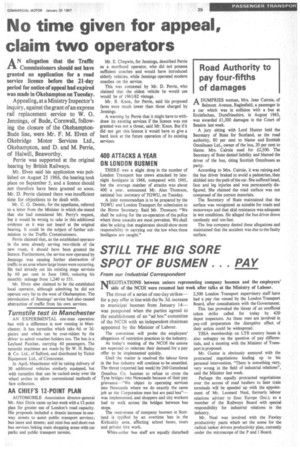STILL THE BIG SORE SPOT OF BUSMEN . . PAY
Page 41

If you've noticed an error in this article please click here to report it so we can fix it.
From our Industrial Correspondent NEGOTIAT1ONS between unions representing company busmen and the employers' side of the NCOI were resumed last week after talks at the Ministry of Labour.
The threat of a series of one-day strikes-– for a pay offer in line with the 9s. 3d. increase to municipal busmen from January 14— was postponed when the parties agreed to the establishment of an "ad hoc" committee of the NCOI with an independent chairman appointed by the Minister of Labour.
The committee will probe the employers' allegations of restrictive practices in the industry.
At today's meeting of the NCOI the unions are expected to reiterate their demand for a pay offer to be implemented quickly.
Until the matter is resolved the labour force in the bus industry will continue to be unsettled. The threat (reported last week) by 260 Gateshead Omnibus Co. busmen to refuse to cross the Tyne bridges into Newcastle because of their pay grievance---"We object to operating services into Newcastle where we do exactly the same job as the Corporation men but are paid less" was implemented, and shoppers and city workers had to walk across the bridges between bus stops.
The restiveness of company busmen in Scotland is typified by an overtime ban in the Kirkcaldy area, affecting school buses, tours and private hire work.
White-collar bus staff are equally disturbed: 2,500 London Transport supervisory staff have had a pay rise vetoed by the London Transport Board, after consultations with the Government.
This has provoked the threat of an unofficial token strike called for today by 420 depot inspectors. As these men are involved in pay-roll preparation the disruptive effect of their action could be widespread.
TSSA membership on LTB country buses is , also unhappy on the question of pay differentials, and a meeting with the Minister of Transport is proposed.
Mr. Gunter is obviously annoyed with the protracted negotiations leading up to his personal intervention. "There is something very, very wrong in the field of industrial relations", said the Minister last week.
Perhaps the equally protracted negotiations over the access of road hauliers to liner train terminals will be speeded up with the appointment of Mr. Leonard Neal, formerly labour relations adviser to Esso Europe (Inc.), as a member of the Railways Board with special responsibility for industrial relations in the industry.
Mr. Neal was involved with the Fawley productivity pacts which set the scene for the radical tanker drivers productivity plan, currently under the microscope of the P and I Board.




























































































































